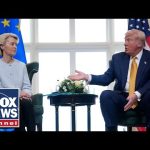In the wild world of Washington, the spotlight has recently turned back to the infamous Russia collusion narrative that captivated the nation during President Trump’s term. Senator Lindsey Graham has joined the chorus calling for a deep dive investigation into what some are labeling a “hoax.” Instead of looking for monsters under the bed, Graham believes it’s time to pull back the curtain on what he suggests was a politically motivated attack against Trump, and he’s doing it with a sprinkle of bravado.
The weekend brought with it some fiery comments from Senator Graham, who emphasized the need to uncover the truth behind the entire fiasco. He pointed out that the long-anticipated documents and testimonies surrounding the collusion allegations may reveal information the public hasn’t yet seen. The senator isn’t waving a pitchfork; instead, he’s advocating for transparency—not a bad idea in a place where information often resembles a state secret.
Support for Graham’s investigation is coming from other corners as well. Senator Tom Cotton has thrown his support behind the call to declassify certain documents from the Durham report, further fueling interest in this politically charged narrative. Cotton believes that the truth lies within these classified materials, and only by shining a light on them can the public fully understand the actions of figures like John Brennan and James Comey during this turbulent time. After all, nothing says “I care about democracy” like peeping behind locked doors.
As discussions heat up, experts, including constitutional law professors and political analysts, are weighing in on the implications. Some argue that the rush to investigate might actually reveal the details of a broader conspiracy. Onlookers have good reason to pay attention: the outcome of such inquiries could reshape how history remembers the period of the Trump presidency, potentially flipping the narrative on its head. If those behind the allegations are found to have participated in questionable activities, it raises the stakes for everyone involved.
But it doesn’t end there. Congressman Rick Crawford added fuel to the fire by labeling the Russia investigation as a complete “fraud” that misled the American people. He argues that the narrative crafted around collusion was not only mistaken but crafted with the intent to damage Trump’s presidency. Crawford suggests that the repercussions for key players involved in this misinformation campaign could arise, especially if the investigation finds evidence linking them to ongoing conspiracies. After all, conspiracy isn’t just a word to scare the kids; it’s a legal tool that can sometimes extend the reach of justice beyond typical statutes of limitations.
In the land of the free, the search for truth may soon uncover lost files and hidden motives in the murky waters of politics. If the past is any indication, those who engage in political mischief are often the first to call foul when their own narratives are challenged. Stay tuned, as America’s attention remains fixated on whether we will actually learn what transpired in this saga or continue navigating through a forest of contradictions and misdirection. One thing is for sure: in Washington, the game of uncovering the truth is just getting started.




